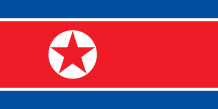

The following outline is provided as an overview of and topical guide to North Korea:
North Korea is a sovereign country located on the northern half of the Korean Peninsula in East Asia.[1] To the south, separated by the Korean Demilitarized Zone, lies South Korea, with which it formed one nation until division following World War II. At its northern Amnok River border are China and, separated by the Tumen River in the extreme north-east, Russia. The capital of North Korea is the city of Pyongyang.
North Korea is widely considered to be a Stalinist dictatorship.[2][3][4][5][6][7] The country's government styles itself as following the Juche ideology of self-reliance, developed by Kim Il Sung, the country's former leader. The current leader is Kim Jong Un, the late president Kim Il Sung's grandson and son of deceased leader Kim Jong Il. Relations are strongest with other officially socialist states: Vietnam, Laos, and China, as well as with Russia, Cambodia, and Myanmar. Following a major famine in the early 1990s, due partly to the collapse of the Soviet Union (previously a major economic partner), leader Kim Jong Il instigated the "Military-First" policy in 1995, increasing economic concentration and support for the military.
North Korea's culture is officially promoted and heavily controlled by the government. The Arirang Festivals or "Mass Games" are government-organized events glorifying the regime, involving over 100,000 performers.
- ^ "North Korea". The World Factbook. United States Central Intelligence Agency. July 2, 2009. Retrieved July 23, 2009.
- ^ Spencer, Richard (2007-08-28). "North Korea power struggle looms". The Telegraph (online version of UK national newspaper). London. Archived from the original on 2007-09-12. Retrieved 2007-10-31.
A power struggle to succeed Kim Jong-il as leader of North Korea's Stalinist dictatorship may be looming after his eldest son was reported to have returned from semi-voluntary exile.
- ^ Brooke, James (2003-10-02). "North Korea Says It Is Using Plutonium to Make A-Bombs". The New York Times (online version of New York, United States newspaper). Retrieved 2007-10-31.
North Korea, run by a Stalinist dictatorship for almost six decades, is largely closed to foreign reporters and it is impossible to independently check today's claims.
- ^ Parry, Richard Lloyd (2007-09-05). "North Korea's nuclear 'deal' leaves Japan feeling nervous". The Times (online version of UK's national newspaper of record). London. Retrieved 2007-10-31.
The US Government contradicted earlier North Korean claims that it had agreed to remove the Stalinist dictatorship's designation as a terrorist state and to lift economic sanctions, as part of talks aimed at disarming Pyongyang of its nuclear weapons.
- ^ Walsh, Lynn (2003-02-08). "The Korean crisis". CWI online: Socialism Today, February 2003 edition, journal of the Socialist Party, CWI England and Wales. socialistworld.net, website of the committee for a worker’s international. Archived from the original on 2007-12-03. Retrieved 2007-10-31.
Kim Jong-il's regime needs economic concessions to avoid collapse, and just as crucially needs an end to the strategic siege imposed by the US since the end of the Korean war (1950-53). Pyongyang's nuclear brinkmanship, though potentially dangerous, is driven by fear rather than by militaristic ambition. The rotten Stalinist dictatorship faces the prospect of an implosion. Since the collapse of the Soviet Union, which deprived North Korea of vital economic support, the regime has consistently attempted to secure from the US a non-aggression pact, recognition of its sovereignty, and economic assistance. The US's equally consistent refusal to enter into direct negotiations with North Korea, effectively ruling out a peace treaty to formally close the 1950-53 Korean war, has encouraged the regime to resort to nuclear blackmail.
- ^ Oakley, Corey (October 2006). "US is threat to peace not North Korea". Edition 109 - October–November 2006. Socialist Alternative website in Australia. Retrieved 2007-10-31.
In this context, the constant attempts by the Western press to paint Kim Jong Il as simply a raving lunatic look, well, mad. There is no denying that the regime he presides over is a nasty Stalinist dictatorship that brutally oppresses its own population. But in the face of constant threats from the US, Pyongyang's actions have a definite rationality from the regime's point of view.
- ^ Baruma, Ian (2008-03-13). "Leader Article: Let The Music Play On". The Times of India. Archived from the original on 2011-08-11. Retrieved 2008-03-27.
North Korea, officially known as the Democratic People's Republic of Korea, is one of the world's most oppressive, closed, and vicious dictatorships. It is perhaps the last living example of pure totalitarianism — control of the state over every aspect of human life. Is such a place the right venue for a western orchestra? Can one imagine the New York Philharmonic, which performed to great acclaim in Pyongyang, entertaining Stalin or Hitler?


